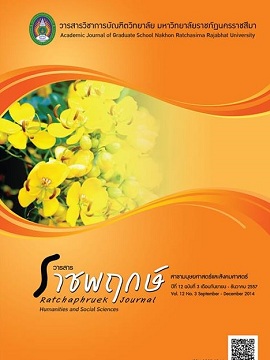The Relation between the Transformational Leadership Behavior and Spiritual Intelligence Behavior of School Administrators under Nakhon Ratchasima Primary Educational Service Area Office 7
Main Article Content
Abstract
This research aimed 1) to study the transformational leadership of school administrators in the schools under Nakhon Ratchasima Primary Education Service Area Office 7 and the spiritual intelligence behavior of the school administrators and 2) to find the relationship between the transformational leadership behaviors and spiritual intelligence behavior of the school administrators. The 144 samples of the study were the school administrators out of 228 population under Nakhon Ratchasima Primary Education Service Area Office 7 using the Krejcie & Morgan Table. The simple random was used to stratified random sampling. The research instrument used for data collecting was the questionnaire in a check-list and a 5 rating-scale form. Mean, standard deviation and Pearson’s Coefficient Correlation were employed as statistical analyses.
The findings were as follows :
1. The Transformational leadership behavior of school administrators in Nakhon Ratchasima Primary Education Service Area Office 7 was overall at the highest level. ( = 4.53, S.D. = .36)
2. The Spiritual intelligence behavior of school administrators in Nakhon Ratchasima Primary Education Service Area Office 7 was overall at the highest level. ( = 4.57, S.D. = .37)
3. The analysis of relationship between the transformational leadership and the spiritual intelligence behaviors of the school administrators. Using Pearson’s Coefficent Correlation was positively highest (r = .641**) with statistical difference at .01 level of significance.
Article Details
References
ชัยเสฏฐ์ พรหมศรี. (2550). Q ที่คุณควรมี. กรุงเทพฯ : เอ็กซเปอร์เน็ต.
ไพฑูรย์ โพธิสาร. 2550. เอกสารสรุปคำบรรยายวิธีวิทยาการวิจัยทางการบริหารการศึกษา Reseach Methodology for Educational Administration. นครราชสีมา : มหาวิทยาลัยราชภัฏนครราชสีมา.
วิกรม กรมดิษฐ์. (2552). CE มองซีอีโอโลก ภาค 4 ชีวิต ผู้ “พลิก” โลก. กรุงเทพฯ : โพสต์บุ๊กส์.
สถาพร ปิ่นเจริญ. (2554). ภาวะผู้นำกับการจัดการ Leadership and management. กรุงเทพฯ : จามจุรีโปรดักท์.
สรวิศ รุ่งเลิศมณีพงศ์. (2 มิถุนายน 2557). “ศาสนาเสวนาพุทธ คริสต์ อิสลาม ประสานมือ นำสันติสุข”. ประชาชื่น. หน้า 12.
สร้อยตระกูล อรรถมานะ. (2542). พฤติกรรมองค์การ : ทฤษฎีและการประยุกต์. พิมพ์ครั้งที่ 2. กรุงเทพฯ : มหาวิทยาลัยธรรมศาสตร์.
ธีระศักดิ์ กำบรรณรักษ์. (2551). ชนะชีวิต คิดอย่างอัจฉริยะ. กรุงเทพฯ : บิสซี่เดย์.
สำนักงานเขตพื้นที่การศึกษาประถมศึกษานครราชสีมา เขต 7. (2553). แผนกลยุทธ์การจัดการศึกษาขั้นพื้นฐาน ปีงบประมาณ พ.ศ. 2553-2557. นครราชสีมา : สำนักงานเขตพื้นที่การศึกษาประถมศึกษานครราชสีมา เขต 7.
สมบูรณ์ ตันยะ. (2550). วิทยาการวิจัย. นครราชสีมา : คณะครุศาสตร์ มหาวิทยาลัยราชภัฏนครราชสีมา.
Cindy Wigglesworth. (2006). Why Spiritual Intelligence is Essentiet to Mature Leadership. [Online]. Available : http://www.isseaustralia.com/Stp1.html. [2013, August 18].
George, Jennifer M. (1991). “State or Trait : Effect of Positive Mood on Prosocial Behaviors at Work.” Jourmal of Applied Psychology. 76(2) : 299-307.
Magen, Zipora and Aharoni, Rachel. (1991). “Adolescens’ contributing toward others : Relationship to Positive Experiences and Transpersonal Commitment.” Jounal of Humanistic Psychology. 31(2) : 126-143.
Organ, D. W. (1988). Organizational citizenship behavior : The good soldier syndrome Lexington. Commonwealth of Massachusetts : Lexington Books.
Smith, C. A., D. W. Organ., and J. P. Near. (1983). “Organezational citizenship behavior Its nature and antecedent.” Jounal of Applied Psychology. 68(4) : 653-663.


